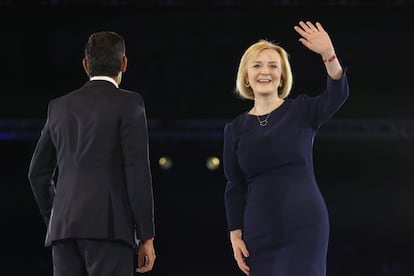Liz Truss to succeed Boris Johnson as Britain’s next PM
The foreign secretary defeated Rishi Sunak in the Conservative Party’s leadership race and is expected to assume her new title on Tuesday. She has promised ‘a bold plan’ to address pressing issues like inflation and rising energy costs

Britain’s Conservative Party on Monday confirmed that Liz Truss is the winner of an internal leadership race that began in late July and will lead to her appointment as the new prime minister of the United Kingdom on Tuesday.
The current foreign secretary will succeed Boris Johnson, who resigned on July 7 after three years in the post marred by a series of scandals. Truss prevailed over her rival Rishi Sunak, former chancellor of the Exchequer, attracting more than 81,000 votes to his approximately 60,000 in a widely expected victory.
Her team has been working for days on the new government’s first decision, which is expected to be a package of direct aid to citizens to face the enormous energy crisis facing the UK. The details are still unknown, but what has been leaked to the media so far points to a limit on household gas and electricity bills, for which the government would subsequently compensate the energy companies. The British energy regulator Ofgem announced more than a week ago that bills could rise by more than 80% this winter. For small and medium-sized businesses, it could spell ruin.
The package of measures that the Truss team is preparing would be similar in scale, to the aid that the Johnson administration rolled out during the Covid pandemic to avoid massive layoffs, the so-called Job Retention Scheme.
The transfer of power will take place on Tuesday, when Boris Johnson is expected to deliver a farewell speech outside 10 Downing Street before flying on a RAF plane to Scotland’s Aberdeen airport, and from there to Balmoral Castle, where he will formally communicate his resignation to Queen Elizabeth II.
Truss will be facing a huge set of problems from day one, including inflation, skyrocketing energy prices, a looming recession announced by the Bank of England, a potential conflict with Brussels on account of the Northern Ireland Protocol that she herself was in charge of scrapping during Brexit negotiations and an autumn and winter plagued by labor unrest with strikes announced in most public sectors.
Tu suscripción se está usando en otro dispositivo
¿Quieres añadir otro usuario a tu suscripción?
Si continúas leyendo en este dispositivo, no se podrá leer en el otro.
FlechaTu suscripción se está usando en otro dispositivo y solo puedes acceder a EL PAÍS desde un dispositivo a la vez.
Si quieres compartir tu cuenta, cambia tu suscripción a la modalidad Premium, así podrás añadir otro usuario. Cada uno accederá con su propia cuenta de email, lo que os permitirá personalizar vuestra experiencia en EL PAÍS.
¿Tienes una suscripción de empresa? Accede aquí para contratar más cuentas.
En el caso de no saber quién está usando tu cuenta, te recomendamos cambiar tu contraseña aquí.
Si decides continuar compartiendo tu cuenta, este mensaje se mostrará en tu dispositivo y en el de la otra persona que está usando tu cuenta de forma indefinida, afectando a tu experiencia de lectura. Puedes consultar aquí los términos y condiciones de la suscripción digital.









































